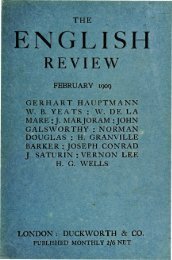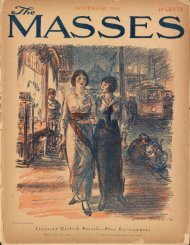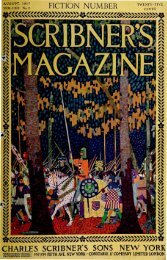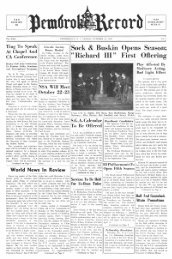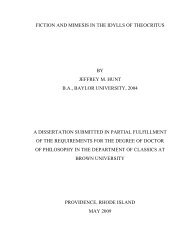View PDF - Brown Library
View PDF - Brown Library
View PDF - Brown Library
You also want an ePaper? Increase the reach of your titles
YUMPU automatically turns print PDFs into web optimized ePapers that Google loves.
180 Arthur Orton's Career<br />
of Orton. This, Stanwood concluded, was<br />
only natural, for no girl, even to her betrothed,<br />
mentions voluntarily the suitor<br />
who has been rejected. As for himself, in<br />
his own immediate and unrealizable bliss,<br />
• he had, for the most part, so broken away<br />
from all reality that any chance thought<br />
of what he had been told was momentarily<br />
lost in the haze of a scarcely present world<br />
somewhere below the empyrean in which<br />
he lived. Then, in the next few years,<br />
there had been nothing to recall Orton at<br />
all. When that personage began to take<br />
his place as a prominent actor in the unseen<br />
drama of Stanwood's existence, he<br />
himself had experienced a decided diffidence<br />
and natural disinclination in referring<br />
to him. Through the very consciousness<br />
of such enforced reticence, the predicament<br />
had received a new complexity,<br />
and from the knowledge that he strove to<br />
keep the fact in the background it obtained<br />
greater prominence.<br />
Sometimes he was led to the belief that<br />
Marian experienced the same constraint.<br />
Once, when the morning's print which she<br />
held at the breakfast-table had contained<br />
particularly prominent mention of Orton,<br />
he had watched her as well as he could.<br />
He was aware that she was quite capable<br />
of appearing utterly unconcerned—as she<br />
did—for with all else, as he knew, she had<br />
exceeding social skill which she might well<br />
at that moment employ for domestic purposes.<br />
At least he could discover little in<br />
her apparently frank face and her ready<br />
directness of gaze. Would, however, the<br />
page which she read bring to her mind<br />
fancies of what might have been? When<br />
he had left the house, would she lose herself<br />
in regretful revery? Or might she not<br />
put the paper resolutely aside, which he<br />
felt must be as bad, striving to push it out<br />
of her sight as he strove to push the truth?<br />
Not that he had ever known reason to<br />
complain of Marian. As the world averred,<br />
the marriage had been an exceptionally<br />
happy one, and for once, as he knew, the<br />
world had been entirely right in its conclusions.<br />
Certainly his case was not an isolated<br />
one. In married life the thought must<br />
sometimes arise of what would have happened<br />
if one or the other had willed otherwise.<br />
The wedding march means such an<br />
absolute turning from other ways that imagination<br />
with a husband or wife will exercise<br />
itself with the fancied vista of other<br />
courses. If ever the better is the enemy of<br />
the good, the assailment comes the most<br />
forcibly with those united by the conjugal<br />
yoke. For such arises with frequency<br />
the question in practical philosophy<br />
of how much less or greater are the<br />
evils one has than those one wots not of,<br />
and the temptation always exists, as he<br />
knew, to give exceeding value to conditions<br />
which may be so freely fancied.<br />
Rarely, though, was the conjuncture so directly<br />
presented as Stanwood feared that<br />
it must be for Marian. Seldom was a generally<br />
vague alternative brought so clearly<br />
forward. Was she sorry? Did she experience<br />
moments, hours, in which she wished<br />
that her decision had been different?<br />
There lay the point for Stanwood. This<br />
was what he felt driven continually to ask<br />
himself—what he did ask himself—the consequent<br />
doubt becoming the recurring disturbance<br />
of his day, the harassing uncertainty<br />
continually arising active and disquieting<br />
in his mind. That was the perplexity<br />
which had beset him since reading<br />
the newspaper at the club as in the same<br />
way he had many times before been beset.<br />
These perturbations accompanied him and<br />
involved him while he walked in an exacting<br />
self-argument in which beginning and<br />
end mingled without conclusion.<br />
The dusk of the evening was deep<br />
enough to be undistinguishable from night<br />
when he turned into the walk which ran<br />
with the drive up to the porte-cochere. His<br />
mind was still occupied with the matter<br />
which had filled his consciousness when he<br />
admitted himself with his latch-key to the<br />
dimly lit hall where there was, however,<br />
enough light to display its discriminating<br />
sumptuousness. He went, after taking off<br />
his hat and overcoat, directly to the<br />
library in the new wing which also clearly<br />
evinced the prosperous status of the establishment.<br />
The rugs were good and<br />
unobtrusively valuable. The silver trappings<br />
of the writing-table were numerous<br />
and heavy. The number of magazines<br />
and books made it not only de jure but de<br />
facto a library. The apartment was unillumined<br />
save for the low light, just sufcient<br />
to make writing possible at a desk<br />
where a woman sat.<br />
"I'm here."



